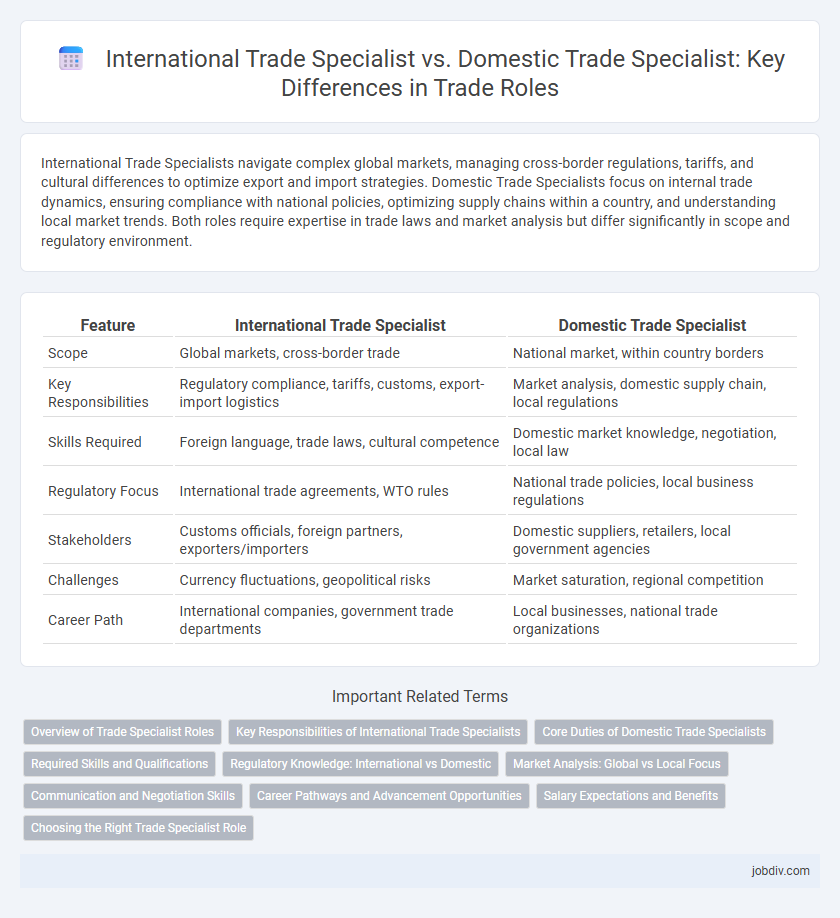International Trade Specialists navigate complex global markets, managing cross-border regulations, tariffs, and cultural differences to optimize export and import strategies. Domestic Trade Specialists focus on internal trade dynamics, ensuring compliance with national policies, optimizing supply chains within a country, and understanding local market trends. Both roles require expertise in trade laws and market analysis but differ significantly in scope and regulatory environment.
Table of Comparison
| Feature | International Trade Specialist | Domestic Trade Specialist |
|---|---|---|
| Scope | Global markets, cross-border trade | National market, within country borders |
| Key Responsibilities | Regulatory compliance, tariffs, customs, export-import logistics | Market analysis, domestic supply chain, local regulations |
| Skills Required | Foreign language, trade laws, cultural competence | Domestic market knowledge, negotiation, local law |
| Regulatory Focus | International trade agreements, WTO rules | National trade policies, local business regulations |
| Stakeholders | Customs officials, foreign partners, exporters/importers | Domestic suppliers, retailers, local government agencies |
| Challenges | Currency fluctuations, geopolitical risks | Market saturation, regional competition |
| Career Path | International companies, government trade departments | Local businesses, national trade organizations |
Overview of Trade Specialist Roles
International Trade Specialists facilitate cross-border transactions by managing import and export regulations, trade compliance, and global market analysis, ensuring businesses navigate complex international trade laws effectively. Domestic Trade Specialists focus on optimizing internal supply chains, local market regulations, and domestic sales strategies to enhance regional trade efficiency and customer reach. Both roles demand expertise in trade policy, economic trends, and regulatory environments, tailored to their specific geographic scope.
Key Responsibilities of International Trade Specialists
International Trade Specialists manage the complexities of cross-border transactions, ensuring compliance with international trade laws, tariffs, and regulations. They conduct market research to identify global opportunities, negotiate contracts with foreign partners, and coordinate logistics for efficient supply chain management. Proficiency in customs documentation, trade finance, and risk assessment enables them to optimize global trade operations and support multinational business growth.
Core Duties of Domestic Trade Specialists
Domestic Trade Specialists primarily focus on analyzing and enhancing trade practices within a country, ensuring compliance with national regulations and policies. They facilitate market access for local businesses, managing supply chains and distribution networks to optimize domestic economic growth. Their core duties include conducting market research, developing trade strategies tailored to internal markets, and collaborating with government agencies to support local trade initiatives.
Required Skills and Qualifications
International Trade Specialists require expertise in global market regulations, foreign languages, international logistics, and cross-cultural communication, along with a deep understanding of customs compliance and trade agreements such as NAFTA or WTO. Domestic Trade Specialists focus on knowledge of local market dynamics, supply chain management, national regulations, and negotiation skills tailored to domestic suppliers and buyers. Both roles demand strong analytical abilities, proficiency in trade software, and excellent interpersonal skills to facilitate trade operations efficiently.
Regulatory Knowledge: International vs Domestic
International Trade Specialists possess extensive knowledge of global regulations, including customs compliance, import-export laws, and international trade agreements such as WTO rules and regional trade pacts. Domestic Trade Specialists focus primarily on national regulatory frameworks, including local commercial laws, state-specific compliance requirements, and domestic market standards. Understanding the contrast in regulatory knowledge is crucial for navigating cross-border transactions versus managing internal trade operations effectively.
Market Analysis: Global vs Local Focus
International Trade Specialists excel in global market analysis, leveraging cross-border data to identify emerging trends, assess international competition, and navigate complex regulatory environments. Domestic Trade Specialists concentrate on local market dynamics, consumer behavior, and regional economic conditions to optimize supply chain logistics and sales strategies. Both roles require deep market insights, but international specialists emphasize geopolitical factors and trade agreements, while domestic specialists prioritize local demand fluctuations and regulatory compliance.
Communication and Negotiation Skills
International Trade Specialists require advanced cross-cultural communication abilities and multilingual proficiency to effectively navigate diverse markets and regulatory environments. They excel in negotiating complex trade agreements, tariffs, and compliance issues with foreign partners, leveraging a deep understanding of international trade laws and economic policies. Domestic Trade Specialists focus on fostering strong relationships within local markets, employing negotiation skills tailored to regional business practices, supply chains, and domestic regulations.
Career Pathways and Advancement Opportunities
International Trade Specialists often advance by gaining expertise in global regulations, export-import compliance, and cross-border negotiations, leading to roles in multinational corporations or trade policy advisory positions. Domestic Trade Specialists typically progress by deepening knowledge of local market dynamics, supply chain management, and regulatory frameworks, moving into senior managerial or government trade liaison roles. Both career paths offer growth through certifications such as Certified International Trade Professional (CITP) for global focus and supply chain or logistics certifications for domestic specialization.
Salary Expectations and Benefits
International Trade Specialists typically command higher salary expectations due to their expertise in cross-border regulations, global market analysis, and foreign exchange risk management, often earning between $70,000 and $110,000 annually. Domestic Trade Specialists usually receive salaries ranging from $50,000 to $80,000, reflecting their focus on local market dynamics and compliance with national trade policies. Benefits for International Trade Specialists often include international travel allowances, language training, and global networking opportunities, whereas Domestic Trade Specialists benefit from stable work environments and region-specific professional development programs.
Choosing the Right Trade Specialist Role
Selecting the right trade specialist role depends on a company's market focus and strategic goals. An International Trade Specialist navigates cross-border regulations, customs compliance, and global market entry strategies, while a Domestic Trade Specialist concentrates on local supply chains, regional market trends, and national trade policies. Aligning expertise with business objectives enhances efficiency in trade operations and supports growth within the targeted economic environment.
International Trade Specialist vs Domestic Trade Specialist Infographic

 jobdiv.com
jobdiv.com